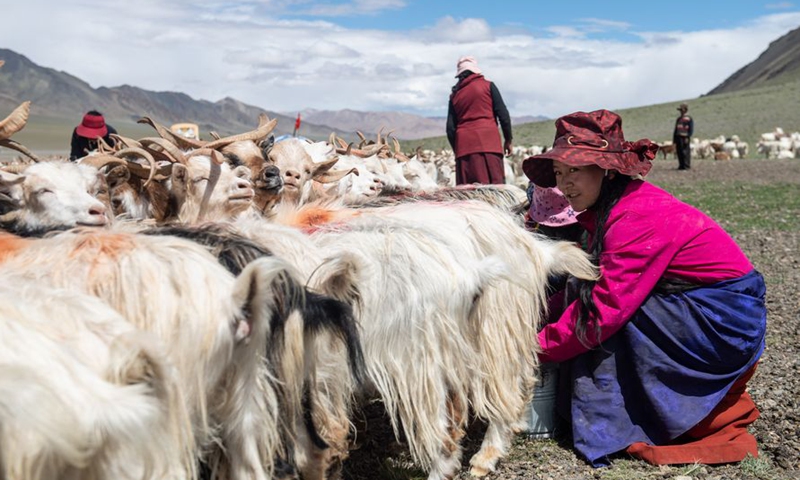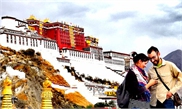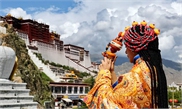Tibetan 'government-in-exile' elects 'leader' under rising uncertainty, won't affect China's policy in region

A herdswoman from a cooperative milks sheep in Rutog County of Ngari Prefecture, southwest China's Tibet Autonomous Region, Aug. 4, 2019.File photo:Xinhua
The so-called "Tibetan government-in-exile" held an election of its new "political leader" over the weekend, who is expected to face several uncertainties, such as the impact from the 14th Dalai Lama succession issue and the COVID-19 pandemic, as well as the needs of the US to use Tibet issue as part of its strategy against China.
Chinese observers noted that whatever the election result will be, it will not affect Chinese central government's policies in Tibet and related issues. China has built comprehensive systems and measures to face any possible challenge, and will focus on the high-quality development, safety and stability of the Tibet Autonomous Region.
Around 80,000 ethnic Tibetans would have participated in the election for Sikyong, or the leader of the illegal "central Tibetan administration," and members of the 17th "parliament-in-exile," reports said.
There are eight candidates, including Dongchung Ngodup, representative of the Dalai Lama in New Delhi, Dorjee Aukatsang, former representative of Dalai Lama to North America, and Penpa Tsering, former speaker of the "parliament-in-exile," media reported.
The second phase of the election will be held in April, the Hindustan Times reported on Sunday. The current leader Lobsang Sangay will step down in May.
Sikyong is similar to a general manager of the exiled organization. It deals with Western governments, asks for money and does some administration work, Xiao Jie, a deputy director at the Institute for Contemporary Tibetan Studies under the China Tibetology Research Center, told the Global Times on Monday.
The election of Sikyong started in 2011, when the Dalai Lama announced he would "retire." "But the fact is that he is still the supreme leader of the "Tibetans-in-exile," and he and his close group will not hand the power out," said Xiao.
However, the Dalai Lama's health has been a problem.
The Dalai Lama's group and the "exiled government" is a mess and not united, Zhu Weiqun, former head of the Ethnic and Religious Affairs Committee of the National Committee of the Chinese People's Political Consultative Conference, told the Global Times on Monday. "These Tibetans are split based on different origins, sects and opinions toward the 'exiled government.'"
The Dalai Lama has been in position for almost 80 years. His death will be beyond their imagination, which will likely trigger a huge mess inside the organization, Zhu said. "The young generations in the group could hardly handle it as they are getting worse."
The impact of the Dalai Lama's reincarnation is just an issue of time. It is a megatrend that Tibetans-in-exile will be divided into different cliques, Xiao noted. But the newly elected Sikyong is not necessarily the figure that will inherit the core power of the Dalai Lama [to dominate the exiled Tibetans], Zhu said. "All forces are dormant and gathering power."
The election is a competition of power among the new generation of local Tibetans, a Beijing-based expert on Tibet issues told the Global Times.
The newly elected leader will also have to be able to satisfy the US' strategic need of making the Tibet issue a long-term topic, even after the 14th Dalai Lama's death. Moreover, he may have to maintain the Dalai Lama's "middle way approach," and deal with the transition of power under the Dalai Lama's reincarnation, said the expert.
Meanwhile, the COVID-19 pandemic has also impacted the administration of the "government-in-exile." Xiao said that it is actually a fragile organization with weak management ability. "The pandemic has further divided overseas Tibetans, during which the authority of the 'exiled government' is challenged."
Observers noted that China-US and China-India relations are key election issues.
Xiao said that the US has been treading on China's redlines on Tibet issues. President-elect Joe Biden and the Democratic Party are enthusiastic about the issue. "It is just a matter if they would decide to touch the bottom line like the Trump administration did," Xiao said.
Some overseas Tibetans have been hyping the Tibet issue and trying to mixing it with the border disputes between China and India, which is dangerous, Xiao said.
China's Tibet Autonomous Region is developing well. All counties in the region have shaken off poverty in 2020.
"China will next focus on the high-quality development of the region, and the chaos from overseas will hardly have any influence," Xiao said, noting that China has a comprehensive legal system and measures to respond to the Dalai Lama reincarnation issue, so the overseas election result will not influence China's policies in Tibet region.
In response to the US President Donald Trump's signing the Tibetan Policy and Support Act, which touched on the succession of the Dalai Lama, Chinese Foreign Ministry spokesperson Zhao Lijian said on December 28, 2020 that the "Reincarnation of living Buddhas including the Dalai Lama must comply with China's laws and regulations and follow religious rituals and historical conventions."
Li Decheng, a research fellow at the China Tibetology Research Center, said in a recently published article that under current conditions, adherence to the historical conventions and important principles for the reincarnation of living Buddhas is a necessary condition for maintaining the normal order of Tibetan Buddhism and maintaining religious and social harmony. The so-called US "act" will only become the laughing stock of the world for its naked interference in other countries' internal affairs and its ignorance.
Media reported that there are about 150,000 ethnic Tibetans living in 40 countries and regions outside China.




